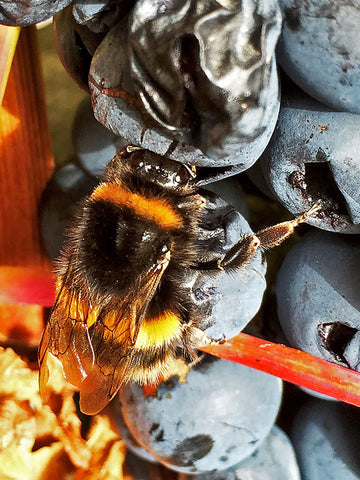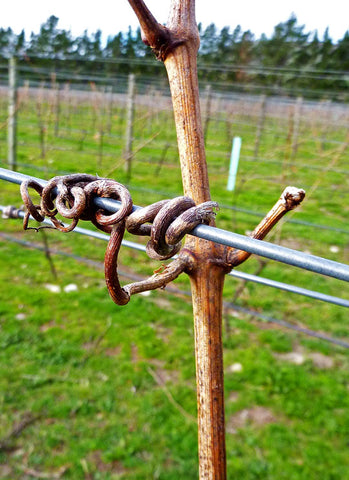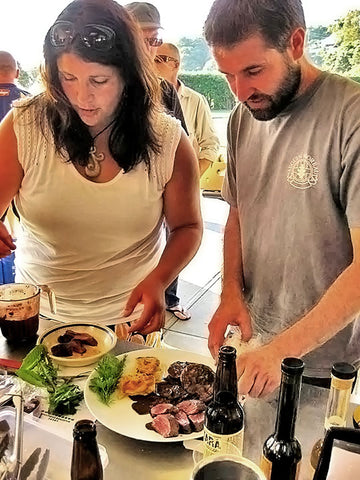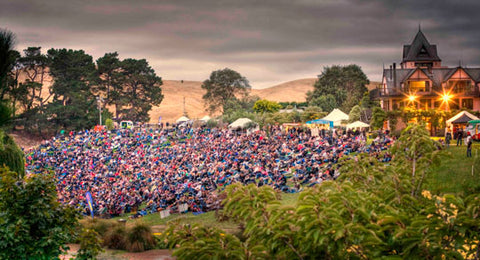Bee Good
“Where the bee sucks there suck I,” sings Ariel in praise of nature in the Immortal Bard’s Tempest. One of the things that we love at Pegasus Bay is working amongst nature in full flight. You see the seasons of the year roll by and their magical effect on all of the plants and animals that we have in our little patch. Nowhere is this more evident than in the world of the tiny; the world of insects. It is filled with fascinating encounters and one such is shown on the cover.
One of our large resident population of bumblebees was snapped while having a secret suck on a pinot noir berry. But like most of our insects he is a good guy, an unpaid worker, which is why Pegasus Bay never sprays its vines with pesticide. This berry has been damaged by a bird peck and by sucking its juice the humble bumble will help dry it out and prevent the bunch from becoming infected. We believe in supporting and imitating nature, which is why we also like sucking pinot noir. We are also trying to be good guys!
Sustaining Sustainability
Pegasus Bay has been involved in New Zealand Winegrowers’ flagship sustainability program since it was first introduced many years ago. We are fully registered as Sustainable. New Zealand winegrowers is the official body that all Kiwi grape growers and winemakers belong to. This eco-friendly program is all about minimal intervention in the grape growing and winemaking processes while caring for the environment. It includes minimising waste and making the best use of resources, such as water. As part of this we compost our vineyard and winery waste and return it to the vineyard. Now Pegasus has gone the extra mile and started installing self composting eco-friendly toilets for vineyard staff. Environmental sustainability should be the concern of us all so we invite you to raise your glass and join us in a toast, “Bottoms up for sustainability!”

Reaching for the sky
Most parents want the best for their kids and aim for them to strive for higher things; to climb the slippery ladder of life at least as far as the parental rungs if not a level or two higher. “Climbing” is generally seen in a positive light. People climb rocks, hills and mountains as pastimes and, figuratively speaking, most of us like to climb up the scale in our jobs, hobbies and sports. But the drive to climb is not restricted to humans and certain animals have taken to the high spots because it offers them an evolutionary advantage. Even plants have done the same, reaching up to gain more sunlight and hence energy that will enable them to grow and propagate.
Every so often climbing is viewed less favourably. Take the “social climber” for instance. No, not the individual who just climbs peaks for the company and bonhomie but the person who tries to lever himself up the social scale on the backs of those he knows and the company he keeps. He is really more of a parasite and has difficulty in standing on his own two feet. Unfortunately, our good old friend the grapevine is the plant world’s equivalent to this.
Grapevines are thought to have originated in the borderlands of Europe and Asia, perhaps somewhere near the modern day Armenia. They are lazy spineless individuals that can’t even support their own weight. In their native habitat they survive largely by hitchhiking lifts on trees. Grapevines use and abuse trees by first latching on to them and then scaling their heights. At the same time they smother their hosts, steal their sunshine and by producing more tasty fruit they compete for the attention of seed-spreading animals and birds. Yes, grapevines save so much energy by not having to build a supporting skeleton that they can produce the sweetest of all fruits, which is one of the reasons why grapes make the best wine.
In the world’s first vineyards grapevines were probably just left to grow up trees and in a few parts of Europe this traditional support is still used. Others train their vines on pergolas but most commonly a trellis, consisting of vertical posts and horizontal wires, is used. In all of these systems the vines’ natural instincts kick in and they grow upwards towards the sunlight. But in order to stay upright and climb a vine needs to grip and the secret weapon that allows this is the tendril; a tough wiry little outgrowth that wraps itself around anything within its reach and clings to it for dear life. It is so tenacious that you may have to cut it to remove the grape’s cane from the trellis; and therein lies a problem.
It is not a problem during life but in death. For in winter, after the tendril has died, it does not give up the ghost but grips on even tighter because it has become lignified and woody. And winter is the time for pruning; when you select one or two canes to leave on the vine and have to pull the rest of them out of the trellis. Then it becomes a major battle between you and those damn little tendrils! You can cut them with secateurs but it is too time-consuming to snip them all so inevitably there is a fair bit of arm wrestling. At least it keeps you warm on a frosty morning and you don’t need to go to the gym for a workout at the end of the day!

Wild about Pegasus Bay Restaurant!
Jannine Rickards, one of Pegasus Bay’s winemakers, is basically an outdoor gal who likes nothing better than a spot of hunting in the hills. Over a year ago she suggested that a foraged food event be held in North Canterbury. While not forage virgins, we were novices at the challenge concept so Jannine and a team of enthusiasts enlisted the help of Bill Manson, a Kiwi who specialises in organising Local Wild Food Challenges in NZ and overseas. The North Canterbury competition was held at the Pegasus Bay Restaurant. Entrants had to prepare a dish in which at least 1 wild food ingredient had been foraged. These were then evaluated by a panel of judges and followed by the prize giving. The collecting of wild foods had to be done in a sustainable manner. We all know what happened to the moas with their tempting drumsticks; don’t we?
It was a real family affair with mum, dad and the kids all participating. Not only did the kids help in finding the wild food but they also cooked in their own competition and naturally played a major part in the eating! Later in the evening Teresa Pert, our wonderful head chef, and her splendid team served a delicious 2 course feasting style dinner made from foraged food.
It was such a success that it is being repeated on 19 February 2016. But you do not have to pick wild fungi from a cliff face, come back from the hills with a wild pig slung over your shoulder or even to grubby your paws by preparing food in order to be part of the party. You can come for the meal or even as a spectator. Tickets for the dinner are available from belinda@pegasusbay.com and the link to this event can be found at www.localwildfoodchallenge.com but hurry as space is limited. Pegasus Bay Restaurant will be closed on 25-26 December and on 1-2 January. It is best to telephone 03 3146869 ext 1 to make a restaurant reservation but feel free pop in and taste our range of wine any time. We will be delighted to see you.

When is it the right time?
“When is the best time to open a bottle of Pegasus Bay wine?” This is a question that we are often asked. Our standard answer is “any time you happen to think of it!” If the enquiry is really when a specific wine will be drinking at its best then that is different matter. It depends on whether you like your wines upfront and fruity or whether you prefer them mellow and complex. Pegasus Bay wines are made to age and we don’t release them until we feel that they are ready to drink. That, however, doesn’t mean that they would not benefit from further ageing in a cool place. Here is a vintage chart indicating our opinion.

Love in the Vineyard
Being a wine enthusiast you’re clearly a sensitive individual and sure to have experienced true love; that indescribable emotion, that all-consuming passion for another. But you can be passionate about things as well as people and not infrequently loves are linked. “If music be the food of love, play on,” said The Bard of Avon in Twelfth Night, emphasising the magical intertwining of such delights. Well, we at Pegasus Bay love not only fine wine but music and we have a very soft spot for orchestras and opera. “Mrs Pegasus”, Christine Donaldson, the matriarch of our tribe, was on the board of directors of Canterbury Opera for 20 years and regularly sang in the company’s productions, referring to herself as a “chorus girl”. Many years ago, Malvina Major, that national and international opera star, sang at the opening of our winery. In those days she was just “Malvina” as it was well before she was knighted. Nowadays, her name is a household word. There followed a series of annual outdoor operatic concerts at our winery, at which Malvina frequently performed.
Well, we are pleased to announce that through their “Player Partnership Programme” the Canterbury Symphony Orchestra will be staging Opera in the Vines in Pegasus Bay’s natural amphitheatre on Saturday, 27 February 2016. The international cast will be led by Kiwi superstar tenor Simon O’Neill, who has sung to high acclaim in major opera houses throughout the world, and will also include Australian baritone José Carbó and Tai-American soprano Ariya Sawadivong. This will be a concert celebrating a number of the greatest hits of opera. You can bring your own picnic or choose tasty fare from an array of food providers.
But if you want to make a very special day of it why not partake in a delicious preconcert 3 course “feasting menu” with accompanying wines at Pegasus Bay’s Vineyard restaurant, which has been named as best in New Zealand by Cuisine Magazine on multiple occasions, including 2015. You don’t even need a designated driver as there will be coach transport from the centre of Christchurch. For more information and reservations see www.cso.co.nz/pwc-opera-vines where there are also links to the booking page via Eventfinda.

From the Prescription Pad
Having spent my working life dabbling about with people’s brains and their behaviour, I am confident that most of us are not confident enough and we are capable of achieving much more than we do. It is not that Joe Average has a raging inferiority complex but simply that he sees himself as being average and doesn’t try to rise above this. Of course, overconfidence is also alive and well so that it is a matter of striking the right balance. My message is that if you aim at a high but realistic target and do your very best then you will probably stun yourself by hitting it.
In the antipodes there has been a tendency to put ourselves down and look up to Europe in matters of culture and sophistication, including in the world of food and wine. Doubtless, at the top of Europe’s vinous hierarchy there are some damn fine wines produced; stunning examples of the best of the traditional styles. These come out of regions like Bordeaux, Burgundy, the Mosel Valley, Tuscany and the like, each area having a smattering of top labels that are rallying calls to wine enthusiasts internationally. They are so famous and limited in their production that you need to mortgage your lover in order to buy a bottle. Because they are so expensive the vineyard owners are rich and can employ the best viticulturists and winemakers, do more work in the vineyard, have lower crops, buy the best oak barrels and so forth. They are excellent wines but the monetary rewards of their success produce a self-fulfilling prophecy, reinforcing the view that their land and labels are clearly superior to their neighbours’.
Such top wines regularly receive rave reviews from wine critics and frequently such assessments are not made blind. At least one of the world’s most influential wine writers refuses to taste any wine blind. Why? Because he says that knowing the label is part of the normal experience of drinking a wine and that he can give a better evaluation by knowing what he is drinking. Doubtless, his expert palate will not be prejudiced by the expectations attached to labels but science has clearly shown that doesn’t apply to mere mortals like the rest of us.
Functional magnetic resonance image (MRI) scanning shows which parts of the brain become active during specific tasks and has been carried out on subjects drinking wine. When they are told that they are drinking “high quality and expensive” wine, not only do they say that they enjoy it more than when the wine is said to be “low quality and cheap”, but the brains’ “pleasure centres” light up more on MRI, even when the two wines are exactly the same. In other words, knowing the wines’ supposed provenance influences not only people’s judgement but the amount of pleasure they actually experience.
The favourite saying of a friend of mine is, “The truth lies in the glass,” and this implies that,” The truth is not on the label.” Unfortunately, many experienced and knowledgeable wine drinkers remain “label drinkers” at heart and will talk up a highly regarded wine that has performed poorly in a blind tasting once its identity is revealed. How often have I heard, “Try it again! It’s much better now. It was just slow to open up in the glass”?
This brings me back to my comments about confidence and we Antipodeans tenancy to put our wines down in comparison with those of Europe. The so called Judgement of Paris is now firmly established in vinous folklore. Prior to the 1970s it was widely believed that new world wines were inferior to those of Europe in general and France in particular. In 1976 Stephen Spurrier, a British wine merchant and educator in Paris, organised a blind tasting of top quality Bordeaux, Burgundy and Californian wines that was judged by French experts. Immediately after their onerous task the judges felt that the American interlopers had put on a good show but they were clearly outclassed by the Frenchies. “Quelle Horreur!”, when the results were announced the cheeky Californian upstarts came out on top of the French aristocrats.
Naturally, such new and old world comparisons have been repeated many times and the new world has generally held its own without difficulty. One of the most recent was a blind evaluation of 100 of the “most prestigious” wines from the 1970s commissioned by the European luxury magazine publisher FINE. These were said to have a combined worth of over $1/2 million. As French wines predominated in the “prestige” department, it is perhaps not surprising that they dominated both the list of entries and the list of high scoring wines. Top slot, however, went to an Australian wine, Penfolds Grange 1971, and Penfolds Grange snared 4 spots among the top 40 wines. There were no New Zealand wines considered prestigious enough to be in the line up.
Generally speaking, our wine industry punches well above its weight. We are relative newcomers on the world stage and produce less than 1% of the world’s wine but wine is New Zealand’s fifth-largest export in monetary terms. It is exported widely and turns up in many unexpected places. I have recently seen quite extensive listings of Kiwi wines in supermarkets and restaurants in Russia and Eastern Europe. The average price paid for NZ wines entering the UK is higher than that of any other country, including France. It’s not that France doesn’t produce some ultra pricey wines but they also make a vast amount of super cheap stuff. Our wines have thus come a long way in a short time.
The new world has a debt of gratitude to Europe and in particular to France for spreading their enlightened food and wine culture but the days when the old world ruled the vinous kingdom unchallenged are well and truly gone. In many instances the top European producers still produce benchmarks for the classical vine varieties and wine styles but some new world wine areas are capable of matching these and others have produced their own distinctive wines that are different but not inferior to the classics. In addition, Europeans attitudes to their own wines and interlopers have gradually evolved. When I first went there in the 1970s, shops sold only wine from their own region and even in big cities it was difficult to buy wines from other countries. That has completely changed and now even France, perhaps the world’s most parochial country with regard to wine and food, is interested in what is happening in the international scene, including New Zealand.
Pegasus Bay and 3 other Kiwi wineries were recently invited to present their wines in Paris and Burgundy. My wife, Chris, and I, along with teams from Ata Rangi, Escarpment and Felton Road, spent a week talking about our wines at tastings and special dinners at the famous Loiseau group of Michelin starred restaurants. We were all surprised and gratified by the interest and appreciation shown. Wine critics, winemakers, wine lovers, gourmets and interested locals were among those who attended. Included were French winemakers who had done vintages at our wineries.
And how did the Kiwi wines stack up against the locals in Burgundy, the home of chardonnay and pinot noir? At times there were discernible differences in emphasis, style and structure but the Kiwi wines were not there to ape French wines. They stood on their own feet, showed confidence and poise and were equally valid expressions of the grape varieties. It is not that we can rest on laurels and that we can’t learn from Burgundian winemakers. We are relative newcomers and our styles are still evolving. We should be cognisant of that, just as the French have recognised that Kiwi wines have come of age.
Well, I need to evaluate the current state of our Pinot Noir so please excuse me while I toddle off to do a little bit of liquid research.

Recent Seasons
The growing conditions of the 2009 vintage were amongst our best and we were delighted with both the reds and whites. The 2010 season was marked by a cloudy and indifferent late spring and early summer. In February, however, the sun began to shine and we had 3 months of perfect weather, resulting in excellent ripeness and levels of natural acidity. The 2011 vintage followed a very warm season and was one of the earliest we have experienced, producing beautiful physiological ripeness. It was a complete contrast to the following season and 2012 was one of the slowest ripening vintages that we have seen. Dry weather in late autumn allowed a prolonged hang time, which has produced a splendid spectrum of flavours and a lively freshness. A mild spring, a warm summer and a long lingering autumn created a perfect prelude to the 2013 vintage. Autumn rain in 2014 caused us to pick sooner than usual but precocious ripening earlier in the season meant that the fruit was physiologically ripe. Later noble botrytis flavoured the aromatic whites.
